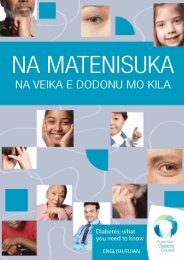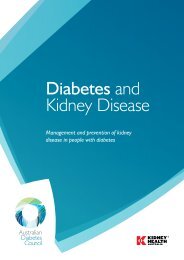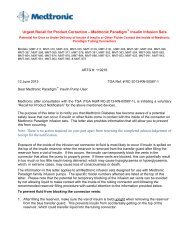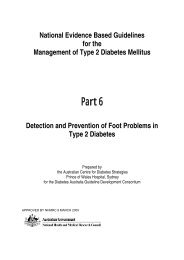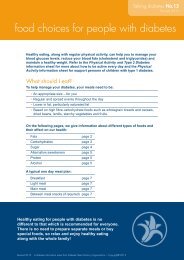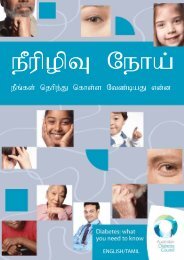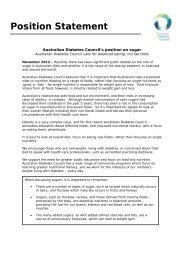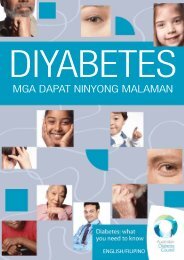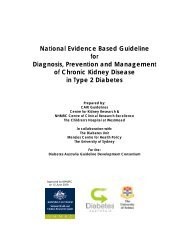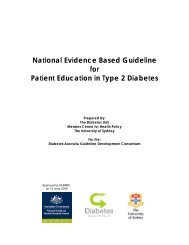O MeA e tAtAU OnA e IlOA - Australian Diabetes Council
O MeA e tAtAU OnA e IlOA - Australian Diabetes Council
O MeA e tAtAU OnA e IlOA - Australian Diabetes Council
You also want an ePaper? Increase the reach of your titles
YUMPU automatically turns print PDFs into web optimized ePapers that Google loves.
20<br />
<strong>Diabetes</strong> and driving<br />
High or low blood glucose (sugar) levels in people with diabetes can affect their ability<br />
to drive safely. People with diabetes may have developed complications such as vision<br />
problems, heart disease or nerve damage, which also can affect driving ability. It is vital that<br />
people with diabetes know what to do in order to keep themselves and others safe while on<br />
the road.<br />
Austroads, the road transport and traffic safety<br />
authority for Australia and New Zealand, has<br />
developed guidelines for doctors to help assess their<br />
patient’s fitness to drive. <strong>Diabetes</strong> and cardiovascular<br />
disease are just two of the many conditions for which<br />
there are specific medical standards and guidelines<br />
which must be met for licensing and insurance.<br />
The main concern when driving is a low blood glucose<br />
(sugar) level. It can affect a driver’s ability to react<br />
and concentrate. Low blood glucose can also cause<br />
changes in consciousness which could lead to losing<br />
control of the vehicle. People who are taking certain<br />
diabetes medication and/or insulin are at risk of<br />
hypoglycaemia.<br />
Ask your doctor or diabetes educator if you are at risk.<br />
Hyperglycaemia or high blood glucose levels can also affect driving ability as it can cause<br />
blurred vision, fatigue and decreased concentration.<br />
Medical Standards for Licensing<br />
Private and Commercial – – People with diabetes who are managed without medication do<br />
not need to notify the Drivers Licensing Authority and may drive without license restriction.<br />
However, they should be reviewed regularly by their doctor for progression of the disease.<br />
Private Licence – People with diabetes who are managed with medication, but not insulin,<br />
and do not have any diabetes complications do not need to notify the Drivers Licensing<br />
Authority. They need to be reviewed every five years (meeting all other Austroads criteria). If<br />
you do have any acute or chronic complications a conditional licence may be granted after<br />
review by your treating doctor.<br />
Commercial Licence – People with diabetes who are managed with medication, but not<br />
insulin, need to notify the Drivers Licensing Authority in person. A conditional driver’s<br />
licence may be granted subject to the opinion of the specialist, the nature of the driving task<br />
and at least an annual review (meeting all other Austroads criteria).<br />
Private Licence – People with diabetes who are managed with insulin need to notify the<br />
Drivers Licensing Authority in person. A conditional licence may be granted subject to the<br />
opinion of the specialist/treating doctor, the nature of the driving task and at least a two<br />
yearly review (meeting all other Austroads criteria)<br />
80



